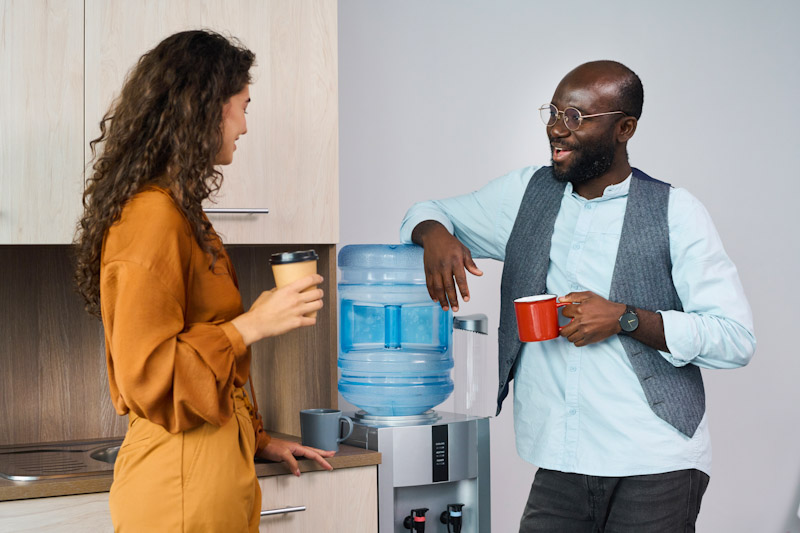Is Alcohol Big in Your Work Culture? Here’s How To Sidestep — Or Talk About It
The "Mad Men" era may be over, but some workplaces can still be particularly challenging in recovery. Some pointers on putting your sobriety first

On paper, your job — where you go to do labor in exchange for wages — doesn’t seem like a place where alcohol use or abstinence needs to be an issue!
But in practice, of course, a job is much more than that simple equation, in ways that can be invigorating or depleting. And in many workplaces, work cultures and work settings, alcohol use is common or, worse, expected.
In many offices, alcohol comes out when you’re breaking the ice at meetings with clients, celebrating company successes or just gathering for an after-work social hour. If you’re in recovery, only you can know if you need or want to be around for these occasions, but the presence and use of alcohol is a trigger for many people.
It’s important to know, however, that there are many simple and straightforward ways to protect your hard-earned sobriety at work. Simple — if not always easy.
Choosing To Stay Sober in the Workplace Comes With Challenges
The modern workplace has generally moved past the “Mad Men”–era alcohol culture; nonetheless, navigating your work environment while maintaining sobriety may not be easy. If alcohol is deeply ingrained in your workplace culture, taking yourself out of these settings and avoiding triggers can be difficult.
A few ways jobs incorporate alcohol as part of the workplace culture — or the work itself:
- Serving or selling alcohol as a business
- Including or even encouraging alcohol use at business meals, meetings and events
- After-hours get-togethers with coworkers or management that revolve alcohol use or take place in settings where alcohol is present
Many sober people, especially in early recovery, find these scenarios challenging to cope with. Yet if you speak up, you might experience tension with colleagues. Sometimes stigmas, ignorance, misinformation or misunderstandings can cause people you work with to not understand how their actions affect your recovery.
Conflict should be avoided whenever possible, but staying sober may mean standing up for your health and well-being. You can be smart about this if you plan for it. You may even win a few friends and influence some people.
How To Protect Your Sobriety When Coworkers Use Alcohol
If alcohol is a big part of your work culture, or you have coworkers who are very vocal or open about their substance use, you can protect yourself in a number of ways:
- Leaving the room, or sticking near an exit, if alcohol or other triggers are present
- Avoiding topics that can veer into substance use conversations
- Politely asking coworkers to refrain from talking about or engaging in alcohol use around you (you’ll have to be the judge of how much you can push for this)
- Informing management or coworkers about your desire to work in a sober environment
Employees deserve to feel safe in the workplace. That should be a no-brainer to coworkers and management in this day and age. And yet! Sometimes you have to take things into your own hands.
If you feel pressured by coworkers to engage in conversations or activities related to alcohol use, you have the option to leave that environment. You can step outside, speak with a friend or sober ally at work, or speak with your supervisor or a human resource representative, if you feel it may endanger your recovery.
You can also start looking to leave the scene altogether. Not everyone has the luxury of quitting jobs that involve alcohol, but you can limit your exposure for now and tune up your resume for later.
Avoiding Triggers at Work and Starting Some Meaningful Conversations
Your coworkers and managers might not understand the damaging effects of allowing alcohol or frequently bringing up the subject of alcohol in the workplace. Even you may still be figuring out where the limits of your own triggers for alcohol lie. Your colleagues don’t have your experiences and may not know anyone in recovery.
However, educating coworkers about how to support someone in recovery can help them understand. You are not obliged to share your diagnosis or details about your recovery. But it’s worth considering saying something: Being open and honest about how their behavior makes your life harder may help them become more empathetic and compassionate.
You might confide in coworkers about your recovery directly, or you could try using a third-person example of how their actions or discussions could be harmful to people in recovery. Find ways to share some knowledge about alcohol use disorder, recovery, and what helps and, ahem, hinders it.

There are other ways you can advocate for yourself, too. Do you want a sober table at the holiday party or an opt-out of certain work dinners? Why not ask? Sometimes, employers may not realize the impact of alcohol being served at business events. If you inform them about the potential to trigger a return to use (aka relapse), they may be more than happy to create a sober space where employees in recovery can feel safe.
Or you may not be triggered by the presence of alcohol and simply want nonalcoholic options at work events. You can ask for that too. Other coworkers, sober or not, will probably appreciate it!
Can Your Employer Support Recovery at Work? Here’s Why They Should
Employers have a unique opportunity to provide recovery support services that improve their workplace culture and ensure individuals in recovery feel supported and perform at their best. Some of the most successful companies are already putting recovery-friendly (or “recovery-ready”) workplace programs into practice and seeing very positive results. If your work culture is open to more recovery-sensitive practices, and sober-friendly activities and events, it’s a win for both your employer and you.
We’ve written previously about what a recovery-friendly workplace looks like (learn more!), but it essentially aims to accomplish two overarching goals, per the Centers for Disease Control:
- Prevent workplace factors that could cause or prolong a substance use disorder
- Lower barriers to seeking and receiving care, and maintaining recovery
Being mindful of how workplace culture affects employees in recovery is essential, and “employees” includes you. According to the Department of Labor, “The fact that [people in recovery] have been able to make the transition from substance use disorder to recovery speaks to their commitment, to their development of skills to help them sustain recovery, and to the supports they have in place.”
So don’t forget: You are an asset to them. You deserve to feel heard and valued.
More Relaunch
I'm in Recovery and Ready To Work. What Do I Need To Know?
A job can bring serious benefits to your recovery, even beyond the financial ones. But it can also test you. If you understand a few things going in — or going back — you'll be golden.
Subs & Drugs & Rock & Roll, Part 3: 'I'm a Loser (And I'm Not What I Appear To Be)'
Don Fertman reaches bottom as the jelly donut hits the wall. The latest installment of the longtime Subway exec's memoir.
Subs & Drugs & Rock & Roll, Part 2: A Day in the Life
Don Fertman woke up one morning 40 years ago and poured himself a drink, as usual. But the future Subway exec didn't know this day would be far from ordinary.
Subs & Drugs & Rock & Roll, Part 1: With a Little Help From My Friends
Don Fertman, longtime Subway exec, writes about a pivotal moment in his 40 years of sobriety: what happened after he went public about his recovery on "Undercover Boss."
Here's How To Make the Office Holiday Party Recovery-Friendly
Four ways to make your holiday party more inviting to employees who are in recovery, according to the Society for Human Resource Management.
How Can I Be a Sober Ally in the Workplace?
You're not in addiction recovery, but you want to show up for people who are. Great! Here's what that looks like at the office.
Your Guide To Hanging Out and Making Friends in College — Sober
Doing college sans drugs and alcohol doesn't have to be a struggle. Some tips on making bonds that'll last and having a blast.
The Benefits of a Recovery-Friendly Workplace
Also called a "recovery-ready workplace," it's a winning proposition for high-quality employers and employees alike.











